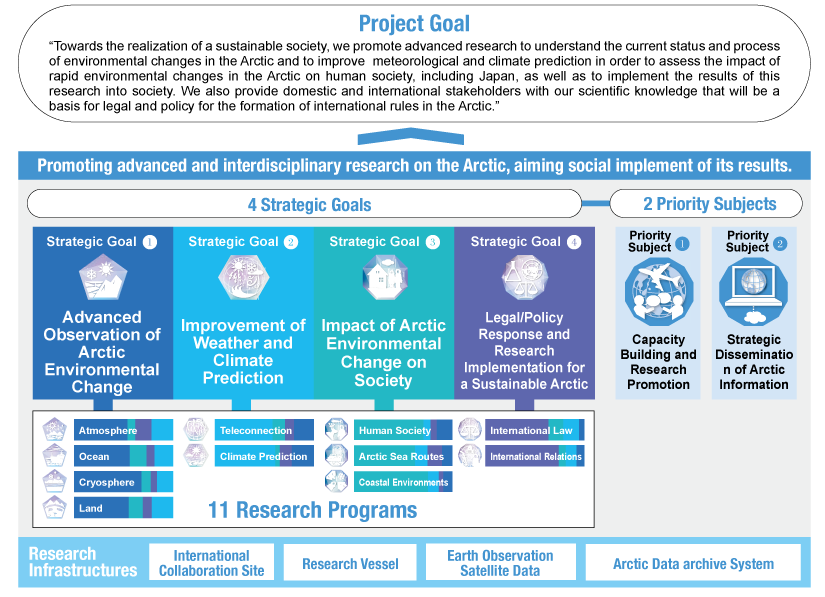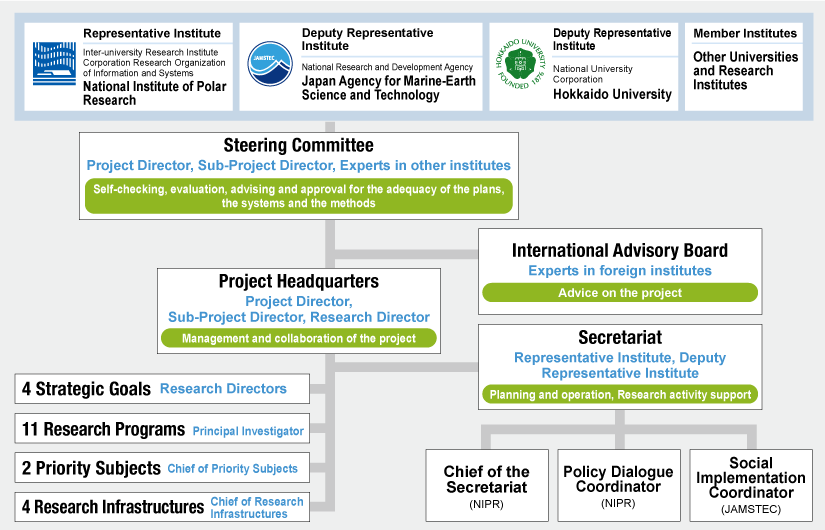Project Overview – About ArCS II
We will promote advanced and interdisciplinary research on the Arctic, aiming for the social implementation of the results.
The Arctic Challenge for Sustainability II (ArCS II) is a national flagship project for Arctic research and a successor to the Arctic Challenge for Sustainability (ArCS) project that operated from fiscal 2015 to 2019. The project will take place over approximately four and a half years, from June 2020 to March 2025, primarily through the collaboration of three institutions: the National Institute of Polar Research (NIPR), the Japan Agency for Marine-Earth Science and Technology (JAMSTEC), and Hokkaido University.
Aiming to foster the realization of a sustainable society, the ArCS II project will promote advanced research to understand the current status and process of environmental changes in the Arctic and to improve meteorological and climate prediction in order to assess the impact of rapid environmental changes in the Arctic on human society, including Japan, as well as to implement the results of this research into society. We also provide domestic and international stakeholders with our scientific knowledge that will be a basis for legal and policy for the formation of international rules in the Arctic.

Background of Project
The Arctic region is where the impact of global warming is most evident. Scientific evidence indicates that rapid changes in the natural environment of the Arctic region, such as a rapid reduction in sea ice and accelerated ice sheet melting, are having a significant impact on the environment and ecosystems – not only in the Arctic, but across the entire planet – and serious concerns for the future have been shared on an international level. Conversely, the decline in Arctic sea ice is expected to lead to a dramatic expansion in economic activity through the utilization of Arctic sea routes and the development of seabed resources – a matter of great interest not only to Arctic nations but also to many non-Arctic nations.
However, expansion of economic activity, including sea route and seabed resource development, risks not only causing irreversible damage to the Arctic environment and ecosystems, which are highly fragile, but also accelerating environmental changes on a global scale.
The Arctic research projects conducted by Japan thus far have elucidated some of the mechanisms for amplification of Arctic warming and its impact on the planet, and have helped deliver scientific findings to key stakeholders.
These projects have also identified that the Arctic is a fragile, finely balanced environment, and that any changes trigger a complex chain of consequences.
However, as the regions observed and data obtained are still limited, international cooperation is needed to eliminate this “vacuum” in observation and achieve a more accurate understanding of the actual status and refine future prediction models.
There is a pressing international need to accurately understand the impact of changes in the Arctic environment on societal activity from not only a local perspective – including the rights of indigenous peoples and resource development and use – but also from a global perspective, and to develop measures in response. In order to tackle issues in the Arctic region, there is a strong international need for holistic research that integrates initiatives to strengthen international scientific cooperation, including participation by non-Arctic countries, with efforts to ensure that international legal and policy order in the Arctic is maintained.
Project Goal
Towards the realization of a sustainable society, we promote advanced research to understand the current status and process of environmental changes in the Arctic and to improve meteorological and climate prediction in order to assess the impact of rapid environmental changes in the Arctic on human society, including Japan, as well as to implement the results of this research into society.
We also provide domestic and international stakeholders with our scientific knowledge that will be a basis for legal and policy for the formation of international rules in the Arctic.
Management
ArCS II has a Steering Committee, a Project Headquarters, an International Advisory Board, and a Secretariat to manage the project.

Representative Institute
National Institute of Polar Research
Deputy Representative Institute
Japan Agency for Marine-Earth Science and Technology
Hokkaido University
Project Director (PD)
Hiroyuki Enomoto (NIPR)
Sub-Project Director (SPD)
Hiroshi Miyaoka (NIPR)
Takashi Kikuchi (JAMSTEC)
Yasushi Fukamachi (Hokkaido University)
Research Director
Teruo Aoki (NIPR)
Hiroyasu Hasumi (JAMSTEC)
Shin Sugiyama (Hokkaido University)
Kentaro Nishimoto (NIPR)
Steering Committee
The role of the Steering Committee is to deliberate important issues and approve decisions related to the project management upon the Project Headquarters’ request. The committee consists of the Project Director (PD), the Sub-Project Directors (SPD) and experts in other institutes.
| Steering Committee Members | |
|---|---|
| Name | Institutes |
| Hiroyuki Enomoto (PD) (Chair) | NIPR |
| Takao Kashiwagi | Tokyo Institute of Technology |
| Takashi Kikuchi (SPD) | JAMSTEC |
| Masaki Satoh | The University of Tokyo |
| Atsushi Sunami | The Sasakawa Peace Foundation |
| Kazuhiro Nakatani | Tokai University |
| Kouichi Nishimura | Nagoya University |
| Mariko Hasegawa | Japan Arts Council |
| Yasushi Fukamachi (SPD) | Hokkaido University |
| Yutaka Michida | The University of Tokyo |
| Hiroshi Miyaoka (SPD) | NIPR |
| Tetsuzo Yasunari | The Research Institute for Humanity and Nature |
(As of April, 2024)
Project Headquarters
The role of the Project Headquarters is to discuss project related matters and make decision on them for smooth implementation of the project. The headquarters consists of the Project Director (PD), the Sub-Project Directors (SPD) and Research Directors.
International Advisory Board (IAB)
The International Advisory Board (IAB) provides appropriate advice on the project plan and outcome from an international point of view. The members are leading experts on Arctic research such as principal investigator of an international Arctic research project, a head of Arctic research institute.
| IAB Members | |
|---|---|
| Name | Institutes |
| Dr. Betsy Baker | Wilson Center Polar Institute, United States |
| Dr. Nicole Biebow | Alfred Wegener Institute, Helmholtz Centre for Polar and Marine Research (AWI), Germany |
| Dr. Hajo Eicken | International Arctic Research Center (IARC), the University of Alaska Fairbanks, United States |
| Dr. Kim Holmén | Norwegian Polar Institute (NPI), Norway |
| Dr. Vladimir Pavlenko | The Institute of Geology of Ore Deposits, Petrography, Mineralogy and Geochemistry of the Russian Academy of Sciences (IGEM RAS), Russia |
| Dr. Peter Schweitzer | Department of Social and Cultural Anthropology, University of Vienna, Austria |
